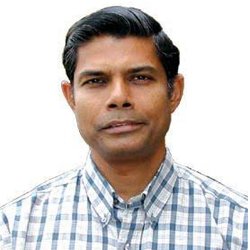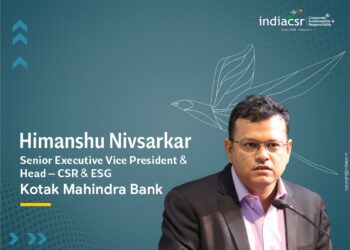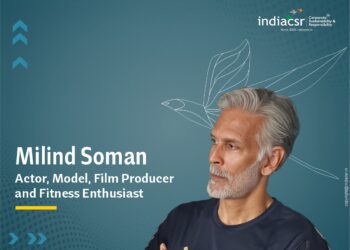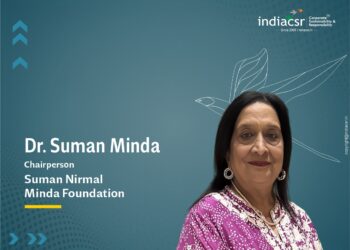WOTR works in rainfed parts of the country, where poverty is most prevalent. Crispino Lobo, Managing Trustee of WOTR sharing his views with Rusen Kumar, India CSR on recent development on rural development. He says that agriculture productivity in India is amongst the lowest in the world. Excerpts of an interview:
Can you please share about the major on-going projects for climate change?
Climate change is happening, and weather variability and extreme weather events are causing severe losses to farmers across the country. In order to address this issue, reduce risks and losses, stabilise agricultural productivity and adapt to changing weather conditions, WOTR has been implementing programs including participatory watershed development and ecosystems restoration, climate-resilient sustainable agriculture, integrated and efficient water management and climate change adaptation, with a special emphasis on building the resilience of vulnerable communities, farmers, and women.
WOTR, in collaboration with IBL, has started the Watershed Management Program, which aims to raise rural household’s incomes by promoting community-driven environmental and landscape regeneration, strengthening farmer’s capacity to adopt climate-resilient agricultural practices and enhancing awareness and skills in water and agriculture management among rural communities. This project is implemented in four states: Maharashtra, Odisha, Madhya Pradesh, and Jharkhand, covering 48,000 people in 63 villages.
Which region is your focus area? What is the impact of such projects on socio-economic development of rural areas?
WOTR works in rainfed parts of the country, where poverty is most prevalent. We are currently working in more than seven states in the country. We have helped improve the community’s adaptive capacities, strengthened ecosystems and biodiversity, and facilitated participatory governance of natural resources through our projects which has impacted the lives of over 3.95 million people across the 3,970 villages. 2.17 million People impacted by watershed development and 15127 Cr. Litres Total Water Storage Capacity has been created. In addition, 1,04,900 individuals impacted by overall health initiatives and 73,243 people received drinking water facilities, 10,077 Self Help Groups promoted covering 1,24,037 women, and 2122 new women’s enterprises have been observed.
How are you helping the farmer community?
Climate change has become a severe issue due to increased drought and extreme weather occurrences, impacting crop growth and significantly affecting the farmers’ community. We e regenerate degraded ecosystems to help rural communities adapt to climate change while expanding livelihood opportunities, improving health, nutrition and the overall quality of life and well-being.
Agriculture productivity in India is amongst the lowest in the world. Our climate-resilient agriculture method assists farmers in reducing climate change risks, increasing productivity, and improving their adaptive capacities. With our interventions there has been a 121 % increase in area under triple cropping, a 25% increase in horticulture coverage, and 15 to 25% boost in agriculture production. We have also developed a mobile application –FarmPrecise in collaboration with the IMD and some ICRA affiliated institutions that generates dynamic weather-based, crop management advisories that are tailored to crop and farm specific conditions. This enables a farmer to make appropriate and beneficial farming decisions. In addition, 131 Agro-met stations have been installed in 4 states, advisories being sent via SMS to 105,705 unique farmers from 1078 villages.
With regards to livelihood, we are assisting in exploring and using agri-allied and other non-farm livelihood possibilities. As a result, the non-farm incomes have increased by 25% and distress migration has decreased by 50%. In addition, 4400 new businesses focusing on livelihood diversification, agri-allied, non-farm, and women-led businesses were launched.
For efficient water management practices, our Water Stewardship Initiatives (WSI) interventions in 196 villages from Maharashtra, Jharkhand, Madhya Pradesh & Telangana has impacted over 55,000 farmer families. The Watershed development in 2,160 villages is affecting 2.25 million people.
Farmers in India face enormous challenges, including access to high-quality seeds, which are out of reach for small and marginal farmers due to expensive rates for superior seeds. The Farmer Producer Organizations (FPO) were created to bring together farmers and producers to enable a better connection between market and rural agricultural produce. Hence 28 Farmer Producer Companies (FPC) have been established in Maharashtra, Telangana, Madhya Pradesh and Jharkhand, assisting 12,057 farmer members from 343 villages to reduce the production costs and to support them in the market linkages.
Tell us about the challenges and opportunities of an NGO for implementing social welfare and climate change programs?
At WOTR, we tackle the key causes of rural poverty by adopting a holistic and whole-of-system approach that seeks to address the underlying causes of the problems confronting rural communities in the context of climate change and market volatility. We identify the key pain points, understand the underlying cause-effect relationships and accordingly craft our interventions across related sectors such as rejuvenating ecosystems, building enhancing the availability of water, increasing the productivity of land resources and agriculture, conserving biodiversity diversifying livelihoods, empowering women, and strengthening the health and nutrition status of women and children, especially. All this to build the resilience and adaptive capacities of communities to climate change and economic shocks.
Please share details about the upcoming programs of WOTR in various regions?
With the support from Andheri-Hilfe Bonn (AHB), WOTR has launched a new watershed development project in Odisha. Adopting an ecosystem-based approach to watershed development, the new project will focus on climate-resilient agriculture, water management, sustainable livelihood, woman empowerment, nutrition and child growth monitoring. The project will impact approximately 15,000 people and encompass an area of over 11,000 hectares. We aim to improve villagers’ livelihoods by uniting and mobilising them around shared challenges like land degradation and water scarcity.
We’ve also expanded our operations in Chhattisgarh, and are working in 43 villages across five districts in the state of Chhattisgarh, covering 10,320 households in Balrampur, Korea, Korba, Gaurela-Pendra-Marwahi, and Kabirdham. WOTR has begun integrated watershed management in the region to enable sustainable agriculture and appropriate cropping patterns. 1500 households in Korea district have benefited from watershed structures, 12.5 million litres of additional water storage capacity has been generated, and 400 farmers are supported through water and land treatment as a result of the effort. We have also initiated work in Surajpur district with 30 villages for vaccination drive.
In terms of climate-resilient agriculture, 200 farmers have adopted climate-resilient agriculture, and 1200 members will be supported to start vegetable farming and kitchen gardens.
We have also launched a Collaborative aimed at promoting Ecosystem-based Adaptation for Resilient Incomes (ECOBARI).
ECOBARI is bringing together individuals and institutions, representatives of Government, civil society organisations, businesses, academia, financial institutions, funds, NGOs and media to pool in resources – human, material and financial, and empower communities to enhance their income while conserving the local biodiversity, restoring and sustainably managing their natural resources aligned with the ecosystem they live in.
How many villages are benefitted by on-going projects of WOTR?
Over the 28 years, WOTR has reached more than seven states working with 3,970 villages impacting around 3.95 million beneficiaries and has trained about 456,484 people in their initiatives.
How are you planning to carry forward the legacy of Late Fr.Hermann Bacher?
Fr. Hermann Bacher, popularly known as the father of community-led watershed development in India spent 60 years of his life in Maharashtra. Struck by the poverty he saw in rural Maharashtra, especially in the then drought afflicted Ahmednagar district, he dedicated his life to the upliftment of the poor, the landless and rural women. We continue to take the legacy forward by our commitment of transforming lives with a special emphasis on building resilience of vulnerable communities, farmers, and women. By 2025 we aim to uplift 720,000 households and 2.9 million people out of poverty in 2,200 villages across 10 Indian states and reach out abroad, particularly in Africa. In addition, we want to regenerate watersheds and landscapes across 650,000 acres in 450 villages. We aim to enhance the capacity of over 880,000 villagers to improve their quality of life and of 2,500 development practitioners to manage development initiatives effectively.
We want to establish W-CReS (The WOTR Centre for Resilience Studies) as a thought leader, and leading think tank in South Asia for applied trans-disciplinary research in inclusive socio-economic development, ecosystems management and climate change adaptation. Further, we seek to build an accredited educational, research and skilling institution of excellence.























